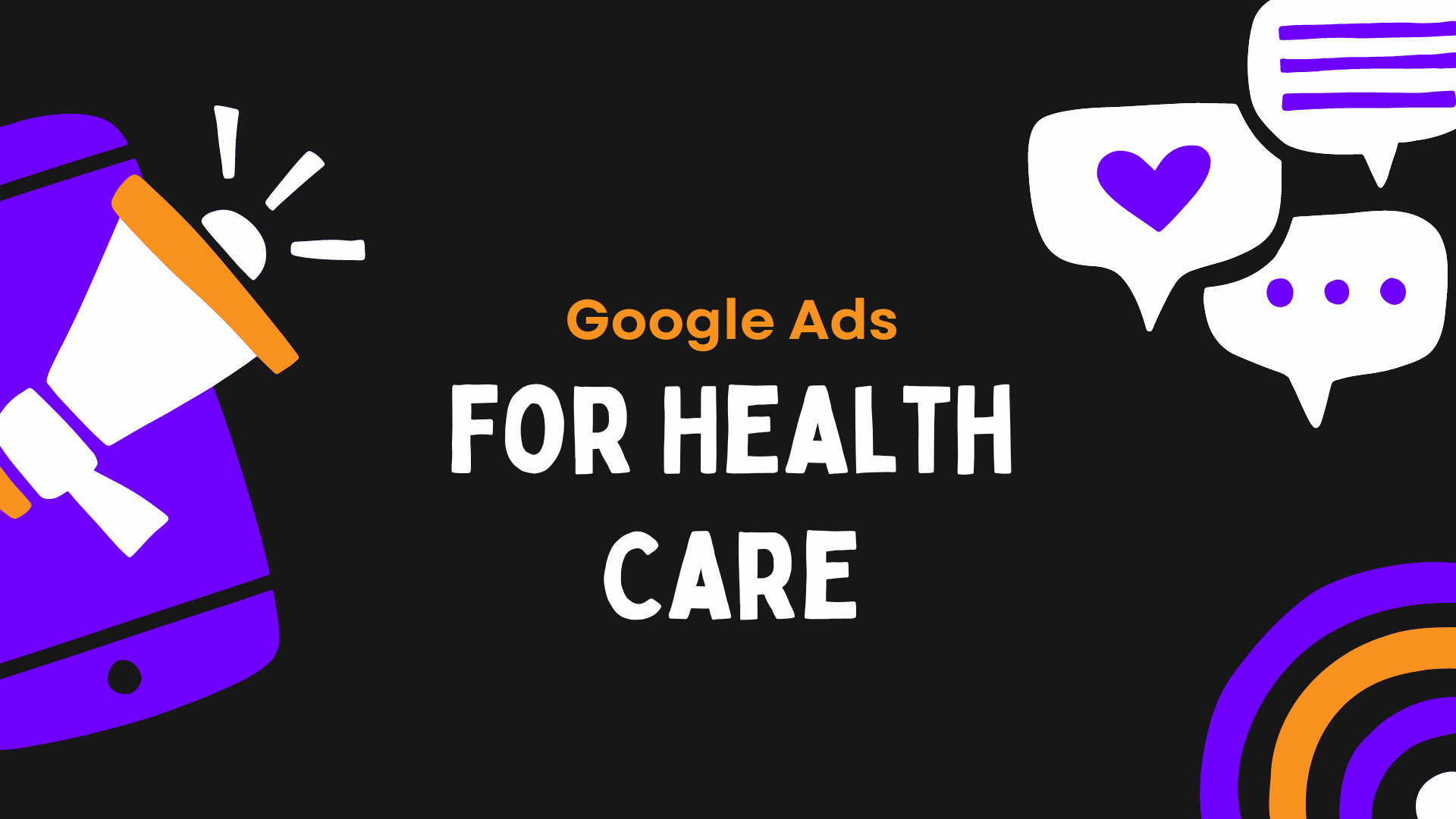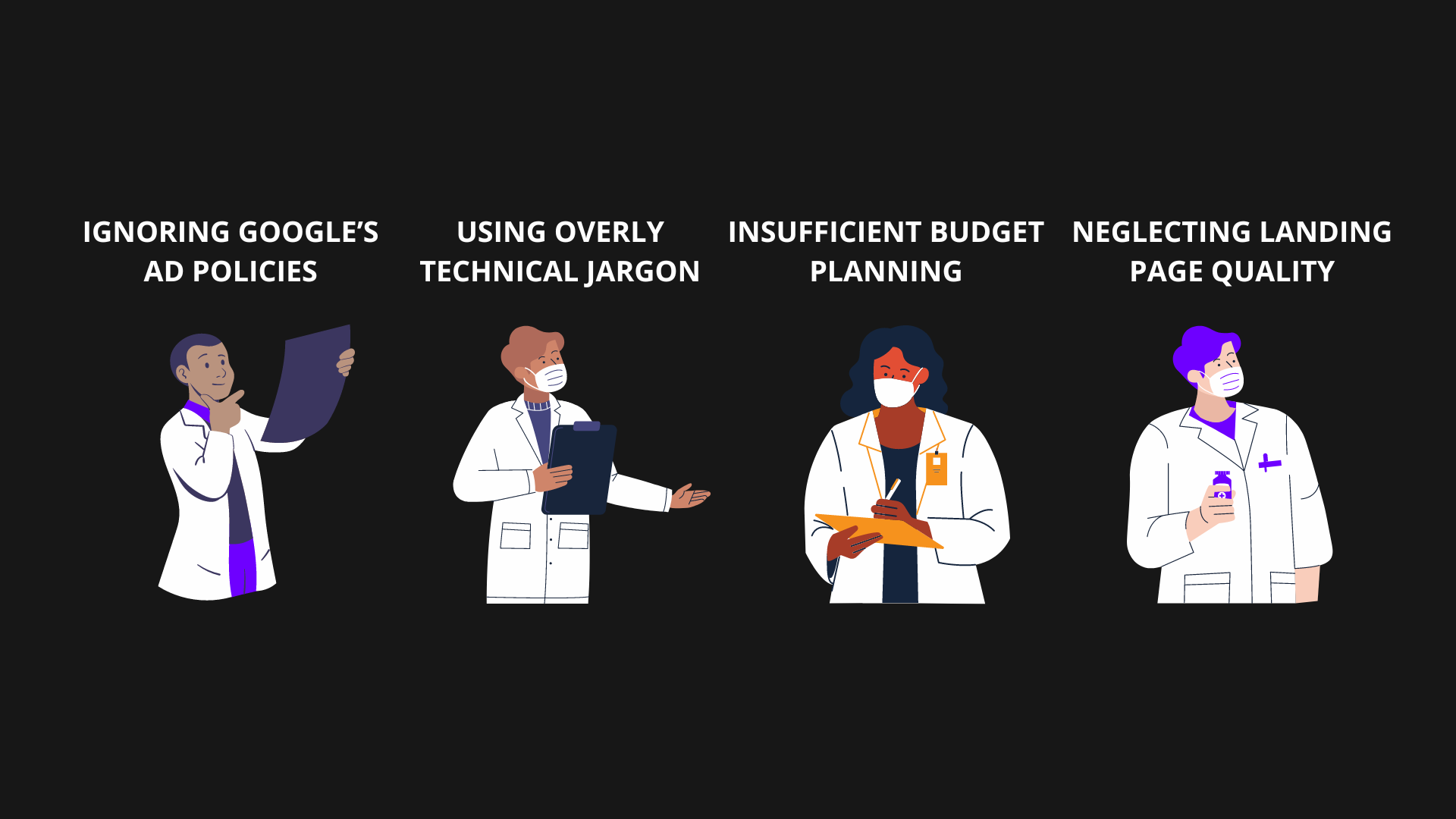Best Practices for Google Ads in Health Care
Reaching patients in the digital world requires more than traditional marketing. Google Ads is vital for healthcare providers to reach internet patients seeking medical services. However, healthcare advertising must comply with tight standards and protect patient privacy.
The article covers Google Ads for health care best practices. We’ll go through everything you need to operate successful healthcare marketing campaigns for your health care business, from advertising policies to keyword tactics to campaign structure.
Why Google Ads is Important for Health Care
Online searches for medical services have been rising as more patients seek them. Healthcare ads help clinics, hospitals, and practitioners target patients seeking relevant health services.
Google Ads for health care providers benefits:
- Google Ads lets medical professionals target particular groups, sites, and hobbies, thereby making sure their ads catch the most relevant potential patients.
- Clinics can establish and control their budget using Google Ads, paying only when someone clicks on their ad, making it less costly than traditional advertising.
- Health care services raise their online profile by showing up in Google results, therefore facilitating patient access to and selection of their offerings.
- Healthcare professionals can evaluate the impact of campaigns, improve marketing materials, and make data-driven choices with Google advertisements.
-
Google Ads can result in more inquiries by boosting traffic to a healthcare provider’s website, so bringing more patient appointments and consultations.
Complying with Google’s Health Care Advertising Policies
Health care advertising is strictly regulated by Google. These rules control ads for medical devices, telemedicine, and prescription medications. Google must also approve mental health, addiction, and particular treatments.
Best practices of Google Ads for health care providers:
- Google’s Policies: Start by familiarizing yourself with Google’s healthcare advertising policies before creating campaigns. This knowledge will help you avoid compliance difficulties and ad rejections. These policies can change, so check regularly.
- Necessary Certifications: Google demands certifications for medication and telemedicine. Before displaying these adverts, make sure your business is certified.
- Transparent Ad Copy: Make sure your ad copy appropriately describes your services. Avoid hyperbole and false claims. Transparency follows Google’s guidelines and increases patient trust.
- Patient Privacy: Create campaigns that comply with privacy laws like HIPAA in the US. Protect patient data and avoid revealing sensitive information in ads.
- Ad Performance and Feedback: Review ad performance and Google feedback often. Address flagged or disapproved ads immediately to maintain compliance. Use this feedback to improve your Google policy understanding.
Google Ads for healthcare providers can conduct effective campaigns that comply with Google’s strict advertising restrictions by following these practices.
Keyword Research and Strategy for Health Care
Effective keyword research is essential for successful Google Ads for health care. Given the competitive market and health-related search sensitivity, selecting suitable keywords can greatly impact your advertising’ reach and efficacy.
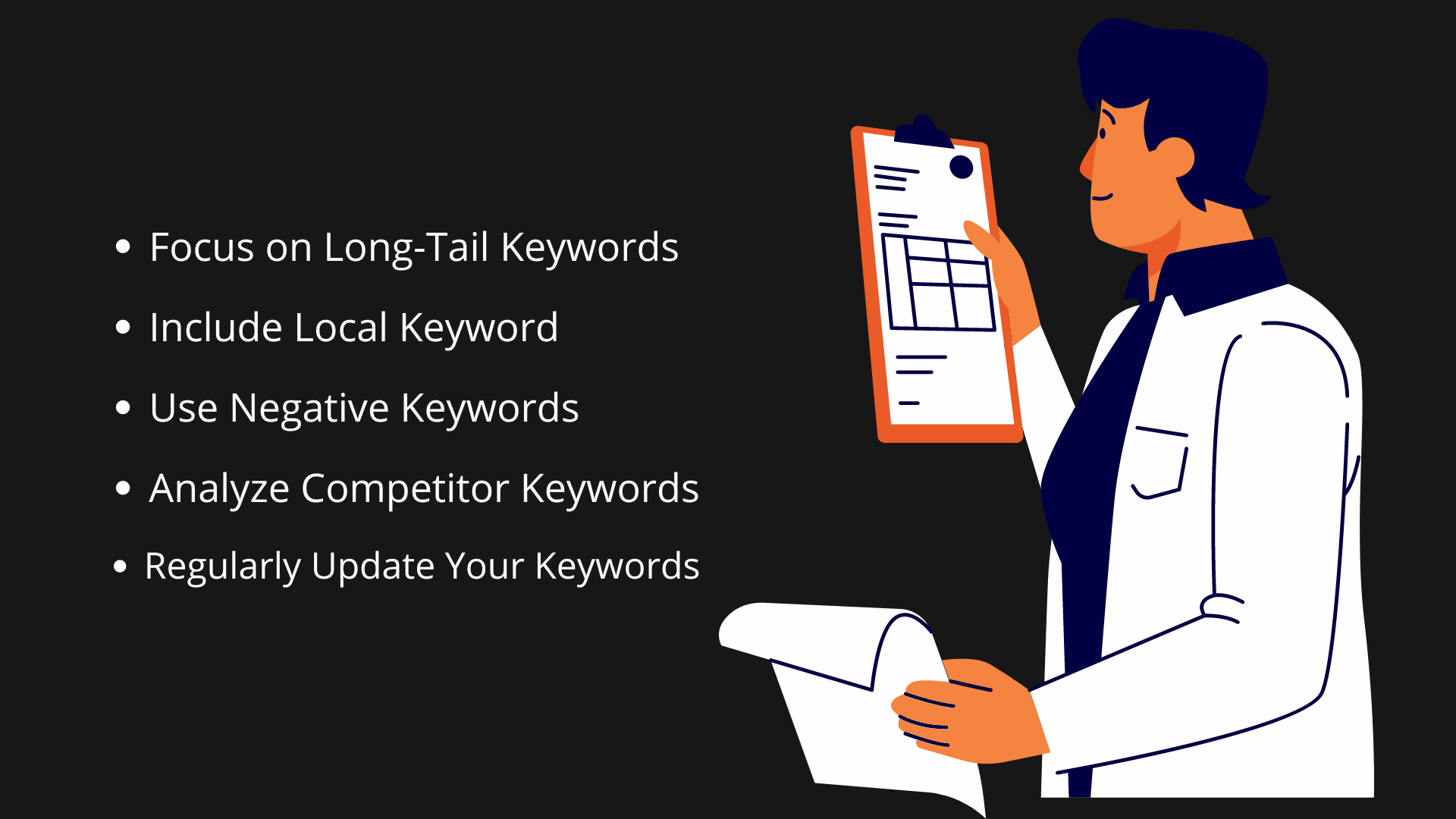 Best practices for keyword research and successful ad campaign strategy:
Best practices for keyword research and successful ad campaign strategy:
-
Patients seeking health care services often use particular phrases. Long-tail keywords are more detailed and targeted, reaching a more specific audience looking for specific treatments or ailments.
- Many health care searches are location-specific because patients prefer local providers. Use location-specific keywords to reach local patients. This method works well for multi-location or community-serving practices.
- Negative keywords are essential to avoid irrelevant adverts, ensuring your budget is spent only on searches that are most likely to convert.
- Study the terms your competitors bid on. This study can uncover strategy gaps and paid search trends you might have missed.
- Update your keyword list regularly to match search behavior and keep digital marketing efforts relevant to patient queries.
These keyword research tactics can help optimize Google Ads for health care providers to increase exposure, reach their target demographic, and increase patient interaction and scheduling.
Structuring Effective Ad Campaigns
Optimizing your healthcare marketing strategy requires successful ad campaigns. A well-organized campaign structure optimizes funding, targeting, and messaging to patient needs.
Key components of campaign structure:
- Clear Objectives: Set measurable goals for your ad campaign. This will influence campaign design and implementation.
- Ad Segmentation: Sort campaigns by service, location, or demographics. Segmentation improves relevance and engagement by tailoring ads to the target audience.
- Specific Ad Groups: Target particular offerings or situations in each campaign. Each ad group should target relevant keywords with ads that address them to enhance relevancy.
- Optimize Ad Formats: Engage potential patients with CTA, image, and responsive banners.
- Plan Budget Strategically: Base your finances on campaign aims and returns. New or experimental services may start with a lower budget than high-priority services with bigger margins.
- Regularly Analyze and Optimize: Track campaign performance, based on data, modify bids, ad copy, and targeting parameters to optimize results. A/B testing some elements in Google’s search results can also improve campaign outcomes.
With Google Ads for health care, physicians may design cost-efficient and effective advertisements that stimulate patient engagement and conversions by thoughtfully organizing campaigns.
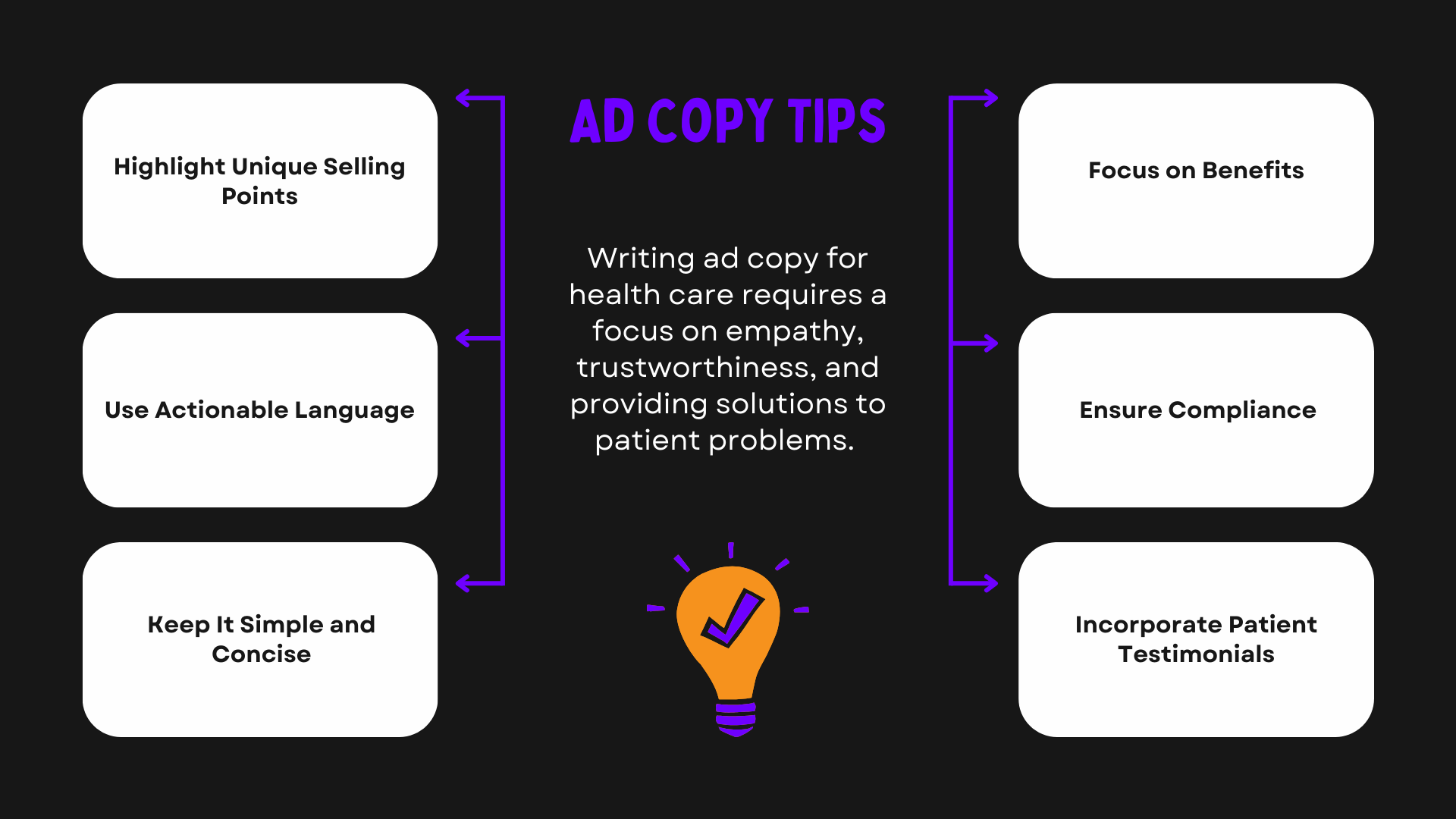 Crafting Engaging and Compliant Ad Copy
Crafting Engaging and Compliant Ad Copy
Effective ad language addresses patient needs and concerns to engage them. It should be concise, straightforward, and suited to the target audience, using language they understand without medical jargon. Adding authentic feedback or unique service offerings might boost the ad’s credibility. Health care advertising regulations also must be followed to maintain integrity and patient safety.
Marketing healthcare providers may reach their audience and build patient connections by balancing involvement and compliance.
Google Ads for Health Care: Leveraging Ad Extensions
Ad extensions increase CTR and provide more additional details. Use call extensions to let patients call, location to reveal your clinic’s address, and site link to direct people to service pages.
Ad extensions let you highlight your healthcare services and raise conversions. By carefully using these extensions, you may provide potential patients with more information, boost click-through rates, and optimize PPC outcomes.
Targeting Local Audiences with Google Ads
By targeting specific regions with Google’s geo-targeting, doctors may contact local patients. Radius targeting lets physicians show adverts to users within a certain distance from their hospital.
Local keywords can also be used in ad content and landing sites to match local patient searches. Localized extensions like location and call strengthen the company’s community presence.
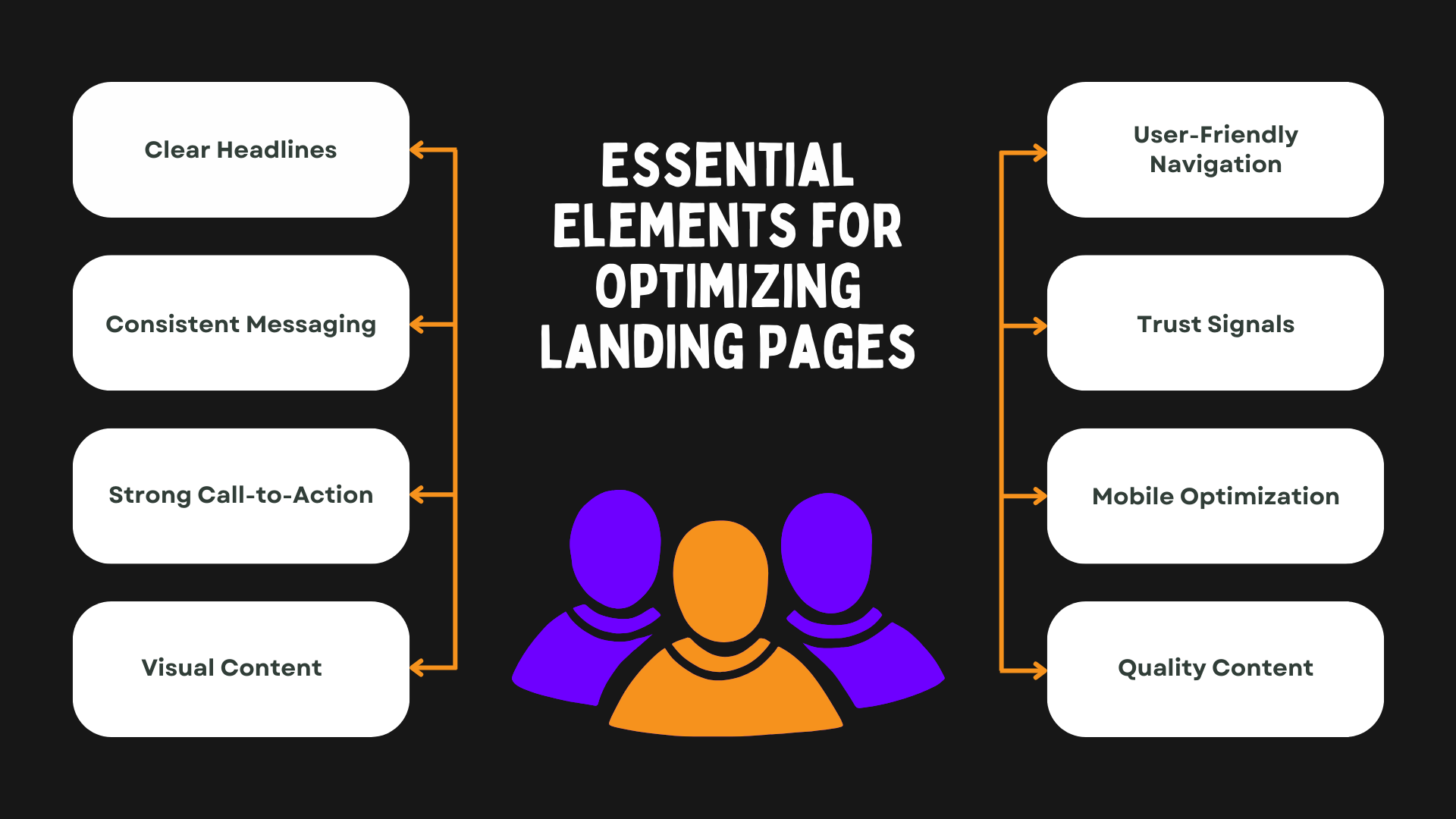 Google Ads for Health Care Providers: Optimizing Landing Pages
Google Ads for Health Care Providers: Optimizing Landing Pages
Your ads and site must be seamlessly experienced. Make your website mobile-optimized, user-friendly, and conversion-focused with clear booking forms and CTAs.
Essential Elements for Optimizing Landing Pages:
Focusing on these components will help you develop an optimal site that converts people into patients and provides an engaging experience. A well-optimized landing page can significantly reduce bounce rates and increase the likelihood of potential patients taking action.
Setting Up Conversion Tracking for Health Care Campaigns
Tracking conversions lets you identify the most effective ads and keywords and alter your strategy. Conversion data also uncovers user behavior and helps optimize landing pages.
Create a Google Ads conversion action and set up the code on appropriate website pages to track campaign conversions.
These actions must be reviewed and updated constantly to suit corporate goals and offerings.
Budgeting and Bidding Strategies for Health Care Google Ads
Optimizing your Google Ads for health care requires an effective budgeting and bidding approach.
- Clear Goals: To improve budgeting, and set targets like generating patient leads or brand exposure.
- Allocate Budgets by Campaigns: Your funding should be divided by ad priority and predicted performance.
- Utilize Bid Adjustments: Implement bid adjustments based on device, location, and time of day to optimize ad spend
- Leverage Automated Bidding: Use methods like Target CPA or Target ROAS to efficiently manage bids and achieve goals.
- Competitor Activity: Keep an eye on concurrence bids and ad placements to be relevant in auctions.
- Adjust Based on Performance: Monitor campaign performance and change budget and bidding techniques to maximize ROI.
Well-planned budgeting and bidding can improve your PPC campaigns’ ROI and bring more qualified leads to your healthcare practice.
Monitoring, Testing, and Optimizing Health Care Ads
High-performing campaigns require constant monitoring and adjustment. Monitor CTR, conversion rate, and CPC. Keep up with industry changes and modify your strategy to stay ahead of the competition.
Google Ads for health care providers cover next tips:
- Stop underperforming keywords and focus on the top ones.
- Use data statistics to boost messaging.
- Use patient input and seasonal trends to modify your strategy.
- Try different landing pages. See which ones convert the most patients.
-
Leverage callouts and site links to offer information and maximize click-through rates.
Common Mistakes to Avoid in Health Care Google Ads
Managing healthcare Google Ads campaigns is complicated, and small mistakes may negatively impact them. Medical professionals can improve campaign performance by avoiding these traps:
Improve Your Health Care Practice Growth with Google Ads
At last, budgeting, bidding, monitoring, and optimizing Google Ads for health care can enhance performance and bring quality leads to your clinic. Health care companies can maximize ROI by avoiding Google’s ad policies, technical language, and imperfect websites. Data insights, A/B testing, and seasonal changes are essential to staying ahead of the competition.
Get in touch with Webugol healthcare marketers for a more specific consultation to improve your marketing plan and succeed in the competitive market!

